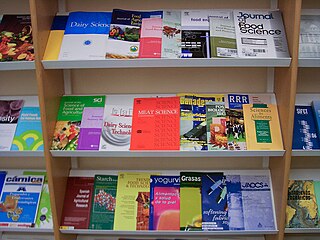 W
WPeer review is the evaluation of work by one or more people with similar competencies as the producers of the work (peers). It functions as a form of self-regulation by qualified members of a profession within the relevant field. Peer review methods are used to maintain quality standards, improve performance, and provide credibility. In academia, scholarly peer review is often used to determine an academic paper's suitability for publication. Peer review can be categorized by the type of activity and by the field or profession in which the activity occurs, e.g., medical peer review.
 W
WAn academic or scholarly journal is a periodical publication in which scholarship relating to a particular academic discipline is published. Academic journals serve as permanent and transparent forums for the presentation, scrutiny, and discussion of research. They are usually peer-reviewed or refereed. Content typically takes the form of articles presenting original research, review articles, and book reviews. The purpose of an academic journal, according to Henry Oldenburg, is to give researchers a venue to "impart their knowledge to one another, and contribute what they can to the Grand design of improving natural knowledge, and perfecting all Philosophical Arts, and Sciences."
 W
WThe African Peer Review Mechanism (APRM) is a mutually agreed instrument voluntarily acceded to by the member states of the African Union (AU) as a self-monitoring mechanism. It was founded in 2003.
 W
WHenry Oldenburg FRS was a German theologian known as a diplomat, a natural philosopher and one of the creators of modern scientific peer review. He was one of the foremost intelligencers of Europe of the seventeenth century, with a network of correspondents to rival those of Fabri de Peiresc, Marin Mersenne and Ismaël Boulliau. At the foundation of the Royal Society in London, he took on the task of foreign correspondence, as the first Secretary.
 W
WPreregistration is the practice of registering a scientific study before it is conducted. The preregistration of studies can help to prevent publication bias, reduce data dredging, and identify otherwise undisclosed HARKing. It has gained prominence as a potential solution to some of the issues that are thought to underlie the replication crisis in science.
 W
WPublons is a commercial website that provides a free service for academics to track, verify, and showcase their peer review and editorial contributions for academic journals. It was launched in 2012 and was bought by Clarivate Analytics in 2017. It claims that over 200,000 researchers have joined the site, adding more than one million reviews across 25,000 journals.
 W
WThe Office of Research Integrity (ORI) is a U.S. government agency that focuses on research integrity, especially in health. It was created when the Office of Scientific Integrity (OSI) in the National Institutes of Health (NIH) and the Office of Scientific Integrity Review (OSIR) in the Office of the Assistant Secretary for Health merged in May 1992. The Office of Research Integrity oversees and directs Public Health Service (PHS) research integrity activities on behalf of the Secretary of Health and Human Services with the exception of the regulatory research integrity activities of the Food and Drug Administration.